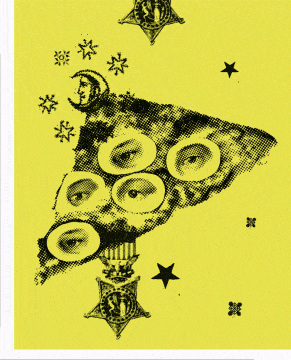Adrienne LaFrance in The Atlantic:
 Conspiracy theories are a constant in American history, and it is tempting to dismiss them as inconsequential. But as the 21st century has progressed, such a dismissal has begun to require willful blindness. I was a city-hall reporter for a local investigative-news site called Honolulu Civil Beat in 2011 when Donald Trump was laying the groundwork for a presidential run by publicly questioning whether Barack Obama had been born in Hawaii, as all facts and documents showed. Trump maintained that Obama had really been born in Africa, and therefore wasn’t a natural-born American—making him ineligible for the highest office. I remember the debate in our Honolulu newsroom: Should we even cover this “birther” madness? As it turned out, the allegations, based entirely on lies, captivated enough people to give Trump a launching pad.
Conspiracy theories are a constant in American history, and it is tempting to dismiss them as inconsequential. But as the 21st century has progressed, such a dismissal has begun to require willful blindness. I was a city-hall reporter for a local investigative-news site called Honolulu Civil Beat in 2011 when Donald Trump was laying the groundwork for a presidential run by publicly questioning whether Barack Obama had been born in Hawaii, as all facts and documents showed. Trump maintained that Obama had really been born in Africa, and therefore wasn’t a natural-born American—making him ineligible for the highest office. I remember the debate in our Honolulu newsroom: Should we even cover this “birther” madness? As it turned out, the allegations, based entirely on lies, captivated enough people to give Trump a launching pad.
Nine years later, as reports of a fearsome new virus suddenly emerged, and with Trump now president, a series of ideas began burbling in the QAnon community: that the coronavirus might not be real; that if it was, it had been created by the “deep state,” the star chamber of government officials and other elite figures who secretly run the world; that the hysteria surrounding the pandemic was part of a plot to hurt Trump’s reelection chances; and that media elites were cheering the death toll. Some of these ideas would make their way onto Fox News and into the president’s public utterances. As of late last year, according to The New York Times, Trump had retweeted accounts often focused on conspiracy theories, including those of QAnon, on at least 145 occasions.
The power of the internet was understood early on, but the full nature of that power—its ability to shatter any semblance of shared reality, undermining civil society and democratic governance in the process—was not. The internet also enabled unknown individuals to reach masses of people, at a scale Marshall McLuhan never dreamed of. The warping of shared reality leads a man with an AR-15 rifle to invade a pizza shop. It brings online forums into being where people colorfully imagine the assassination of a former secretary of state. It offers the promise of a Great Awakening, in which the elites will be routed and the truth will be revealed. It causes chat sites to come alive with commentary speculating that the coronavirus pandemic may be the moment QAnon has been waiting for. None of this could have been imagined as recently as the turn of the century.
More here.
